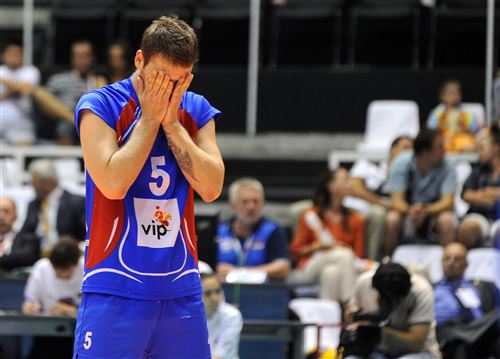I’m sure you’ve been on court sometime and thought, what if I make a mistake now? What if I mess up this point, this shot or this receive?
Is this fear really valid or not?
Mistakes can be viewed in several ways. There are however, two main standpoints which differentiate successful people from the rest.
One way is to experience mistakes as tragedies and failures.
The other way is to view mistakes as lessons and an integral part of the game.
Which way is more useful?
When we begin to participate in some sports, we make errors in the performance elements of the game, i.e. technical and tactical mistakes. As time goes by and we practice more, the number of mistakes is reduced, and we become better and better technically.
We „clean up“ our technique and improve our tactics.
Do you know any athlete, whether in football, tennis, volleyball, basketball, shooting, anyone that never makes a mistake?
I don’t.
Mistakes are part of the game and everybody makes them from time to time. The question is, how often do you make mistakes, when do they occur and how do you react?
How does a mistake influence your performance? Does it freak you out so that you immediately make another one?
In young teams this is often the case. Everything goes well for them in a game and then they make a mistake, then another and another. A whole series of errors, the match takes a new course, and generally, the team that makes mistakes loses. Someone makes a mistake and the rest of the team just seems to follow him. No one can end the bad streak.
Have you ever watched the Cuban volleyball team? As a rule, they have very young players. At the start of the game they are jumping, blocking, hitting service, everything seems perfect, they are flying round the court. Then the first error occurs, then another, they loose their momentum, then the set. Eventually they even lose the game.
How we can learn from our mistakes?
It’s not about the mistake, it’s about your response!
During the game there is no time for analysing errors, only for minor fixes and small tips during the time-outs.
We therefore need to work on our responses to mistakes long before the game begins. During the game it’s already too late.
Tactically it’s easily solved by agreeing beforehand which player will take responsibility after two mistakes in a row.
From a psychological standpoint, the question is, how to get back on track after a mistake?
From an early age we were taught „play point by point“, „forget what happened, concentrate on the next action“ or „don’t look at the scoreboard, think only about your performance“ and similar sporting mantras.
Are they enough? Do those mantras really help each and every athlete to find their own way back into the game?
In my opinion everyone should have his own system. I personally talked to myself in such moments. I gave myself simple instructions. Some of my colleagues would have a melody in their head, a song to remind them for a moment that they are top players.
Some might have a specific way of breathing, some go to another place in his mind where he feels great, some players make a grimace or a gesture that seems to reset them and some don’t do anything but wait for things to solve themselves.
What’s important is to find out what works for you.
All of this needs to be prepared and rehearsed well before the game, of course.
There is an old Buddhist story that I would like to share with you. They say that there are three types of people: rock people, who carve every emotion into themselves, sand people, who only retain an emotion until the first wind blows, and those we should strive to be, river people, because the water brings us something, it come to us, we accept it, learn from it and let it flow onwards.



